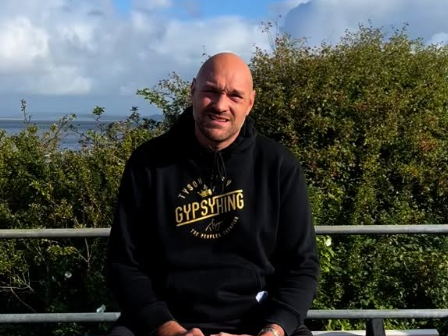Tyson Fury’s financial career resembles a rocket launch driven by unrelenting desire and unexpected turns rather than a gradual ascent. With a current projected net worth of $160 million, Fury is not only one of the most prosperous heavyweight fighters of his generation, but he is also quickly becoming a brand in his own right, akin to LeBron James or Conor McGregor, but with a British flag and witty personality.

Despite losing by split decision, the fight against Oleksandr Usyk in March 2024 brought in an incredible $100 million minimum purse. By any standard, that salary alone would rank him among the highest-paid sportsmen in the world. Fury was actually listed by Forbes as the third-highest paid athlete of 2024, right behind Ronaldo and Messi. His estimated $146 million in earnings for that year shows how boxing still has tremendous revenue potential when combined with smart promotion.
Tyson Fury – Bio, Career and Financial Snapshot
| Category | Details |
|---|---|
| Full Name | Tyson Luke Fury |
| Nickname | The Gypsy King |
| Birth Date | August 12, 1988 |
| Birthplace | Manchester, England |
| Height / Reach | 6 ft 9 in (206 cm) / 85 in (216 cm) |
| Weight Division | Heavyweight |
| Professional Record | 37 Fights — 34 Wins (24 by KO), 2 Losses, 1 Draw |
| Titles Held | WBC, WBA (Super), IBF, WBO, IBO, The Ring |
| Net Worth (2025) | Estimated $160 million |
| Recent Earnings | $100M+ from Usyk fight in March 2024 |
| Other Ventures | Furocity energy drinks, Netflix docuseries, bestselling books |
| Ranking (Aug 2025) | 1st by The Ring, 8th by BoxRec |
| Reference | celebritynetworth.com/richest-athletes/tyson-fury-net-worth |
Fury’s rise is especially inventive because of the way he has combined boxing supremacy with marketing acumen and business knowledge. Launched in 2022, his Furocity brand is a lifestyle range that includes recovery shakes, protein snacks, and caffeinated gum in addition to energy drinks. Although athletes frequently sign their names to endorsements, Fury assumed responsibility. He went from being an endorser to an entrepreneur by creating this product line from the ground up.
Another daring foray into media was the Netflix documentary series At Home With the Furys. The program gave viewers a glimpse into the boxer’s colorful yet turbulent home life when it premiered in August 2023. The fighter who previously claimed he was “born to fight” had his edge softened by it, and it was astonishingly successful in humanizing his image. Ratings showed that the decision was successful, drawing in both boxing enthusiasts and binge-watchers, which significantly increased his income outside of the ring.
Fury’s success as a writer highlights his diverse brand even further. When his autobiography Behind the Mask was published in 2019, it immediately shot to the top of the Amazon bestseller list. It detailed his struggles with addiction, despair, and the demands of being a champion—a story that many people found both motivating and alarming. The book struck a chord not only because of Fury’s character but also because it exposed the person he was prepared to acknowledge as himself. For his supporters, his return felt much more intimate because he displayed a level of vulnerability that is fairly uncommon among top athletes.
From a historical perspective, Fury’s ascent is reminiscent of Muhammad Ali’s showy, business-minded tactics, but with the commercial flexibility of contemporary boxers like Floyd Mayweather. He has benefited from worldwide syndication, pay-per-view incentives, and carefully negotiated guaranteed purses, just like Mayweather. But unlike Mayweather, Fury’s appeal lies more in his extraordinary humanity outside of the ring than in his untouchability in it.
Fury has faced and defeated some of the most well-known heavyweights of the time during his career. He ended the Ukrainian’s lengthy rule and won several belts in 2015 after defeating Wladimir Klitschko, which was mostly regarded as the upset of the decade. He was named Fighter of the Year by The Ring for that fight. In 2020, he regained his position as the lineal heavyweight champion after defeating Deontay Wilder via knockout in their second bout, which greatly improved his marketability. Their already explosive legacy was further fueled by their third fight in 2021, which was voted Fight of the Year.
Crucially, Fury hasn’t let his financial prosperity numb his competitive nature. Despite his repeated declarations of retirement, he always comes back with a purpose, frequently emphasizing that boxing is more than simply a job; it’s a kind of therapy. Considering that there are rumors of a final rematch in the pipeline, possibly in Saudi Arabia, his recent split-decision loss to Usyk doesn’t seem to be the end.
Fury has built an incredibly resilient financial portfolio by building on his prior successes, venturing into entrepreneurship, and continuing to be an intriguing yet unpredictable public personality. With £162 million in assets disclosed in 2024, Tyson Fury Ltd., his limited liability business, is now a corporate engine rather than merely a personal possession.
Fury’s riches is unique because he has continuously diversified his sources of income with remarkably astute timing. Unlike most boxers, his income is not solely based on his physical prowess. He created a structure in which, similar to how Dwayne “The Rock” Johnson transitioned from wrestler to media tycoon, bouts raise his profile but his brand functions independently.
From packing stadiums to putting protein bars on store shelves, Fury has significantly enhanced the model for how sportsmen may create long-lasting businesses. He continues to be extremely flexible in how he positions himself across the growing markets for health-focused products, global fight nights, and streaming platforms.











